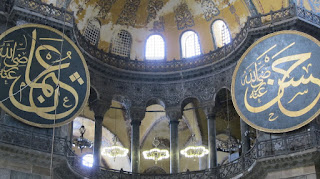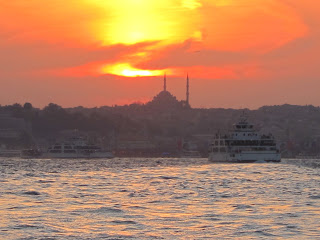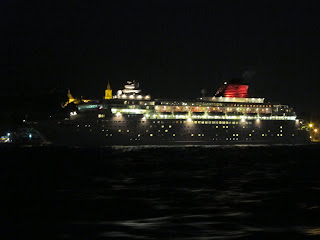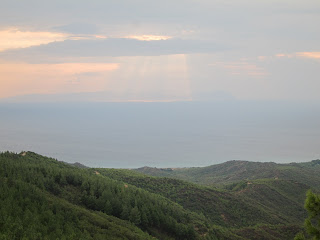
With my Iranian visa application stuck in geo-bureaucratic hell somewhere between London and Istanbul, I had time on my hands to exlpore Turkey. Not knowing anything about the country, I flicked through a tour brochure to get some general ideas as to where to go, and set about visiting them independently. My first stop was Kayseri, in a region called Cappadocia. It is at the heart of Turkey, almost plum centre, and was home to the first recorded human settlers in the country. I had heard about the landscape, and the famed balloon rides, but that was that. I was travelling blind.
Outside the airport I sat on the curb and waited for what I assumed would be a shuttle bus into town. There I got talking to an American couple, Carlos and Tammi, who had booked a private tour of Cappadocia. They kindly offered me a place in their shiny 4x4 for the day, which, needless to say, solved a few problems. After some confused negotiating with the driver ("Them - no problem. You - problem") I got a ride for 75 lira and the tour for free.


The climate was noticably cooler - we were at an altitude of almost 1000m. Nothing compared to the behemoths that await in Kyrgyzstan and China, but it was still a breath of fresh air after the sweaty streets of Istanbul. We were driven through canyons, orchards and gulleys, glimpsing the bizzarre and beautiful homes built into rock formations, where people lived for hundreds of years.
Our first stop was the enormous ancient underground city of Kaymakli, the largest of its kind in Turkey. The first Christian settlers lived here, and could stay for months at a time to protect from attacks by invaders from the West. Archaeologists estimate that over 10,000 people lived here at one point, which seems almost impossible to imagine once you're inside. The city is a labyrynth network of caves, many of them impossible to navigate without crouching or even squatting. The technology involved was immense - they constructed ventilation shafts, kitchen compartments, graveyards, and even wine-making facilities. All of this conducted under mere torchlight. (Look at how modern I am, belittling fire.) I didn't have my camera with me, but if you search for "Kaymakli underground city" in Google images you'll get a good idea.
We had a delicious home-cooked lunch in a shaded garden: Me, Carlos and Tammi, Kamil the guide, and the driver. Here, for the first time, I realised how glad I was not to be mixing with English people. Meeting young English travellers abroad is generally a deflating experience. As a rule, the closer they are to my age and background, the less interesting I find them. After all, that's the reason we're both here - to meet a different sort of person. Often it makes you realise why you got on the plane in the first place, namely to avoid conversations like the one I had on my very first night in Munich:
English traveller: Where are you from, then?
Me: Shropshire.
English traveller: Oh... Bye.
If you're ever abroad, and want to avoid talking to English people, tell them you're from Shropshire. I swear it works every time. Typically Londoners are the worst - one girl in Istanbul started the "where are you from" rigmarole with an original approach: "So you're a Londoner, yah?" I explained that I wasn't. She seemed confused - disappointed, even. I skipped the Shropshire bit and simply explained: "I'm from between Wales and Birmingham." This did not help her. Asking a Londoner to envisage the West Midlands as a geographical entity is rather like asking a dog to do your internet banking. The dog is not mentally equipped to carry out such a process. Better it stay on its favourite carpet and chew its own foot for a bit. Or complain about having to wait a whole ten minutes for another bone to arrive.
Before I left, my mate Loz warned that the quickest way to bankrupt oneself abroad is to go boozing. This may well be true, but at this rate I'm barely losing a penny due to the amount of people who have bought me a drink after hearing my travel plans. So far I've been bought a beer by people from Australia, Canada, New Zealand, South Africa, Finland, Scotland, England (ok, there are some advantages to meeting the English aborad) Japan, and Germany. Usually they're over 30, and feel a mixture of pity and admiration for what I'm attempting. Every time I've offered to get a round in, they've refused. So much so that I've almost taken it for granted, and feel disappointed when someone doesn't get me one. You really can have too much of a good thing.
In Istanbul, watching the Stoke-United game in a bar, I got chatting to a Scot named Hamish, who was in town for a wedding. Except he wasn't, as his wife had fallen in, so he snuck out to the pub. When I told him I was going to Iran he puffed out his cheeks, and proceeded to buy me drinks. This was mightily generous of him, but he knocked off pint after pint so fast that I could barely keep up. He said that he worked on the floor of an investment bank, supervising the traders. After some interrogation he admitted it was RBS. I told him that I wasn't a taxpayer, so he had nothing to worry about. He duly bought me another beer.
Finding a decent hostel has been made ten times easier by - you guessed it - the internet. I use hostelworld.com, which has a database of thousands of hostels, campsites, guesthouses etc. all over the world, complete with customer reviews, pictures, maps and detailed price lists. I can book ahead with just a few mouse clicks, paying a small deposit up front. After each stay you are invited to rate individual aspects of the hostel, and leave a comment. Consequently it separates the wheat from the chaff, and has generally helped to drive up standards. If your hostel has a poor rating, or receives negative feedback, then you can wave goodbye to any business. It's not entirely trustworthy - there's always the odd eejit who complains about the wi-fi reception in his room that he's paid the grand total of €3 for. But, as a general resource, it's incredibly useful.
There's a theory that the internet has taken the true spirit of adventure out of travelling. Personally, I can't comment, as I'm from a different generation. I'm a touch skeptical, though. Michael the German had little time for hostelworld etc., and explained how back in the day, if he had no money left and couldn't find accommodation, he would go to a bar, find a girl and sleep with her. Thank goodness then, in my case, for hostelworld. (If you're reading this, Michael, that was called self-deprecation. It's what us English indulge in to pretend we're comfortable with our football team being awful, among other things. *Update - our rugby team as well*)
Pumpkins!
The primary criticism of relying on the internet is that, since you can plan and pre-book almost every facet of your journey, you rarely experience the thrill of spontaneity. Well, the other day I was twiddling my thumbs in Istanbul, and had a causal browse of a budget airline website. 24 hours later I was in the back of a 4x4 driving through Cappadocia and the most extraordinary countryside I have ever seen. All thanks to the near-infinite knowledge and practicality of the internet. Maybe if I had ditched the guidebook and hitchhiked into the middle of nowhere, I could have met some fascinating people - but I did anyway. In my opinion the world wide web is a phenomenal resource for the traveller, and anyone who dismisses it outright should be openly mocked. Also it gives me a platform to witter on without interruption (aka this blog.)
I stayed for two nights in a hostel in Goreme, probably Cappadocia's most visited town. Turkey overall has pound for pound the best hostels I've stayed in. Often when venturing into Europe, particularly with your mates, you begin by seeking hostels that are known for having the best 'atmosphere,' closest to the liveliest bars, clubs etc. After three weeks on the road, when you've just been on an overnight bus from Plovdiv and haven't shaved in two weeks, the only thing you ask yourself is "do the showers work" and "are the bedsheets clean?" Everything else is inconsequential. You create your own fun, and wherever you go you'll meet interesting people. It's a bit like going off to university - if you haven't made a bunch of friends in your first two weeks, then you're doing it wrong. Just talk to people, that's all.
I'm fortunate to be blessed with the golden currency of travel: command of the English language. In a typical European hostel, you will meet French, Swedish, American, Latvian, Aussie, Portuguese, Chilean, Korean, or indeed any nationality, all conversing in English. (It goes without saying that all the staff speak it too.) It makes me feel vaguely embarrassed to have such poor language skills myself. In Zagreb earlier this summer, a French guy asked me: "Comment t'appelle tu?" (What is your name?) He may as well have been speaking Vietnamese. He scolded me for not even having a basic command of a language that I had been taught for three years. To be honest, he was right. As for my estimation of the teaching of foreign languages in English state schools... well, I won't bore you.

In Goreme I met another Scot, Duncan, who modestly revealed that he had in fact already been to every country that I plan to visit, shattering my illusions of intrepidness. He mentioned some good walking routes nearby, so I decided to set aside a whole day for exploring on foot. Armed with a vague, flimsy map, I decided to follow the main road for a bit, which climbs up to the top of a long ridge. After 20 minutes I was looking down onto the whole surrounding area, which looks extraordinary regardless of where you're viewing it from. I spotted the greenish valley that Duncan described, and proceeded to climb down a steep slope, with the help of an old woman whose garden I had clambered through. From the bottom you realise that many of the rock formations look completely different from below than above. I had yet to notice the bizarre ledges that stick over from the top, which are so smooth and attractive that it's hard to believe they were created by chance.

At the end of the valley was Uchisar, a small town on a hill overlooking everything. In the castle I bumped into a Dutch girl who was staying at my hostel, Denise, and two of her friends. We estimated that we had two or three hours of sunlight left, so we descended from the town in search of the sinister-sounding Love Valley, which would take us most of the way back. After much walking around in circles, we abandoned the idea, and decided to walk back along the top of the ridge, and get to Goreme before dark. We found a good spot to sit and gawp at the panorama, and I dug out Hassan's peppers and bread for a sunset picnic.



It was soon after that I met an American, Georgios, who happened to be taking the same picture of the same dead tree in the same spot as myself. He told me how to cheat your camera to take effective shots at sunset (like the one above), and later we went for dinner. Over Turkish pide he reminded me that life is short, and that we should spend our money on things we want to do, rather than wait glumly for a rainy day. He told me about his nephew, who died in a motorcycle accident on the one day of his life that he hadn't been wearing a helmet. To compound the tragedy, his head had struck the wall of the local church, where they prayed every Sunday. We agreed that we should savour every enjoyable moment that life allows us.
On this note - remember that flash flood from my previous post? It killed three people.
That wasn't all I learned about fate and death in Goreme. Firstly involving myself - if the old woman hadn't been there to guide me, I would have traversed the tight hand side of the rock and dropped vertically for about 30 feet. Scary, but not as scary as a story Duncan told me about a bus journey he took from Turkey to Iraq. Only three other people boarded the bus (I can't think why), so he ignored his ticket and went straight to the back. The bus driver, though, insisted that he sit in his assigned seat, so he returned to the front. A few hours later, in the middle of the night, he woke up to the sound of screeching brakes, as a herd of sheep ran across the road. A few seconds later, another bus slammed into the back of them at 80mph, utterly destroying the rear half of the coach. If it wasn't for the pettiness of the driver then you wouldn't be hearing this story. (If that isn't chilling enough, another passenger received a phone call five minutes after the crash. It was his sister, who had just woken up from a bad dream, involving him: "What happened?" she said. He hung up with a face like death.)
Not a bad writing spot
Cappadocia is the most astonishing place I have ever been to. It's a strange and beautiful region, utterly unique, full of endless surprises. By the end I had a headache just from looking at things. At the top of the Goreme ridge, depending on which direction you look, you could be in four separate continents. The rocky brown ridges are remininscent of the Utah desert; the rolling dunes look as if they have been planted from the Sahara; the terraced hilltop town of Uchisar could be Italian; and everything else belongs on the moon.
And then there's the balloons. I didn't go on one - at $220 a pop I couldn't justify the expense. Watching them all float up at daybreak is an experience in itself, and one that doesn't cost a penny. About thirty of them drifted in complete silence, and I got a few decent pictures.
























































